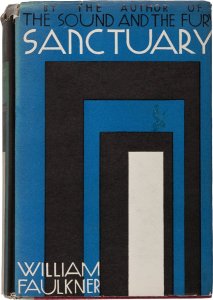
Many readers tell me they start The Sound and the Fury by William Faulkner and then quickly give up because it’s too confusing. That’s not surprising. In this author’s fourth novel, which he believed to be his best, Faulkner challenges readers by shifting abruptly in time between past and present, let alone starting the book with a demanding first-person narration by the mentally challenged Benjy Compson. The novel is a 20th century classic, the one many believe they should read if they’re going to read or tackle Faulkner. I typically recommend Absalom, Absalom! instead because it’s the novel among Faulkner’s great ones that I enjoyed most.
I have doubt, though, about that recommendation. I haven’t read all of Faulkner’s novels. Maybe I should recommend the scandalous, dark potboiler Sanctuary that Faulkner wrote to make money – and that attracted reader attention to his work for the first time. Except readers want to read an important Faulkner novel, just like they want to tackle James Joyce’s Ulysses. You can’t preen about having read Joyce’s A Portrait of the Artist as a Young Man like you can preen about having read Ulysses – and like you can preen about having read The Sound and the Fury. It’s not escape or an unputdownable reading experience that’s at play here. It’s an accomplishment.

The doubt about my Faulkner recommendation also comes from being fascinated by Faulkner as a person. When I blurt out that I love Faulkner, it doesn’t mean I love his books, rather all that is of him: his life in Oxford, Mississippi, at his home Rowan Oak; his script writing days in Hollywood, working for Metro-Goldwyn-Mayer and film director Howard Hawks; his long road to getting published, the richness of his imagined Yoknapatawpha County, how his work progressed and the effect literary critic and editor Malcolm Cowley* had on his reputation; his speeches and essays that speak thoughtfully and intellectually about the human condition; and his individuality.
The last page of William Faulkner: The Cofield Collection, a photography book illustrating Faulkner’s life, tells of a typewritten note appended to the back of a framed portrait of Faulkner taken by photographer Jack Cofield. The note says:
“I once read a statement by Rudyard Kipling (made, I think, in one of his last interviews in London), which I think applies to Bill Faulkner the man as well as William Faulkner the author: ‘The individual has always had to struggle to keep from being overwhelmed by the tribe. To be your own man is a hard business. If you try it you’ll be lonely often, and sometimes frightened. But no price is too high to pay for the privilege of owning yourself.’ Bill Faulkner lived up to this principle to a T.”

The Culture Trip’s The Nine Best Books by William Faulkner You Should Read describes the prose of Sanctuary as “considerably more fluid than a lot of Faulkner’s denser novels, and thus easier to grasp for readers less familiar with the author’s particular style of writing.” It describes The Sound and the Fury as “a notoriously arduous and disturbing read, whose often disorienting narration requires patience and persistence.”
In Flavorwire’s The 50 Best Southern Novels Ever Written, eight of the 50 are by Faulkner. No wonder they refer to him as “that titan of American letters.” Among the eight, The Sound and the Fury is called his best novel, while Absalom, Absalom! is called “the greatest Southern novel ever written.” That’s enough for me to continue recommending it as the one to read. As for me, I have a desire to keep reading Faulkner, but it has to be the right time. To randomly pick up one of the titan’s complex novels as a next book to read feels like selecting a complex, expensive wine to drink when you’re thirsty. One needs to be ready to read Faulkner.
*Malcolm Cowley and the Nobel Prize: By 1944, William Faulkner was off the literary radar screen. “His seventeen books were effectively out of print and seemed likely to remain in that condition, since there was no public demand for them,” Malcolm Cowley writes in The Faulkner-Cowley File. Cowley, recognizing Faulkner’s neglected genius, brought his literature back into public focus with The Portable Faulkner, published by The Viking Press in 1946, which Cowley edited and introduced. Faulkner won the Nobel Prize for Literature in 1949. Speaking of that prize, I recommend reading Faulkner’s short, moving acceptance speech in which he says, “the basest of all things is to be afraid.” His words resonate today, including this famous quote:
“I believe that man will not merely endure: he will prevail. He is immortal, not because he alone among creatures has an inexhaustible voice, but because he has a soul, a spirit capable of compassion and sacrifice and endurance.”

Years ago, I read several Faulkner novels back to back. “Absalom, Absalom” being the stand out. However, “As I lay dying” is only one I returned to in recent years. Also a fave. I, too, admire the man, not just the books. Including his fondness for good bourbon!
LikeLiked by 1 person
I could see re-reading “As I Lay Dying.” And I also want to re-read “The Sound and the Fury” because I think I was too young when I first read it. I have a feeling I’d more fully understand it the second time around. And yes, he did indeed love bourbon, which I think he used in his mint juleps.
LikeLiked by 1 person
Thanks for the information. I now believe I’ll tackle Faulkner before I take the trip to the great beyond for at 82 years I have far more yesterdays than tomorrows.
LikeLiked by 1 person
Be sure to check carefully into the ones that interest you: Read a plot synopsis, and read a random interior page. Good luck!
LikeLike